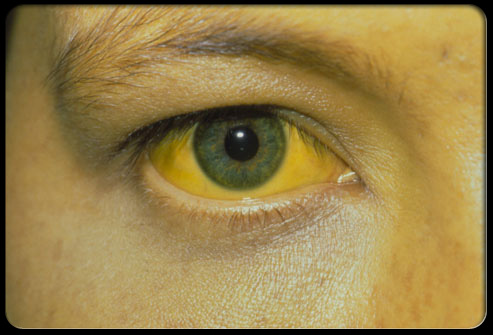
Acute Viral Hepatitis is a liver inflammation resulted from infections with 1 of the 5 hepatitis viruses. For most individuals, the inflammation starts abruptly and lasts only several weeks.
Acute Viral Hepatitis symptoms commonly start abruptly. the symptoms include nausea, the feeling of being ill, vomiting, and fever. In smokers, a typical symptom is a distaste for cigarettes. some people, especially, who have hepatitis B virus, develop wheals (red itchy hives) on the skin or joint aches. After a several days, the urine becomes dark and jaundice can progress. Most symptoms usually disappear at this point and individual feeling better, even through jaundice becomes worse.
Cholestasis (bile flow reduction or stoppage) symptoms such as general itching and pale stool can develop. Acute Viral Hepatitis is usually diagnosed based on the results of blood tests and on individual’s symptoms. a doctor finds the enlargement of liver or tenderness in about 50% of individuals with such disease and tries to distinguish Acute Viral Hepatitis from other diseases with similar symptoms.
An Acute Viral Hepatitis’ specific diagnosis can be confirmed if blood tests show antibodies against hepatitis infections or viral proteins. Acute Viral Hepatitis may produce various symptoms from a minor flu-like condition to fatal failure of the liver. An individual, who has Acute Viral Hepatitis, generally recovers after four to eight weeks, even without treatment.
An individual with this disease may become a virus chronic carrier. In the carrier stage, the patient experience no symptoms but is still infected. Such incidence happens only with hepatitis B and C infections, not in hepatitis a. a chronic carrier can develop cancer of liver. Preventing of spreading hepatitis a virus consists of proper hygiene. Hospital workers can lower their risk by screening all blood donors for hepatitis B and C viruses by using blood donated by volunteer, rather than paid donor. Vaccination against hepatitis B stimulating body’s immune defense and protecting most individuals as well. Vaccines against hepatitis a virus are given to individuals at high risk of acquiring the infections. no vaccines exist against hepatitis E, D and C infections.
Individuals who have not be vaccinated and who were exposed to hepatitis, can recieve immune serum globulin (antibody preparation), which is given immediate protection against viral hepatitis. Individuals with extremely severe acute Viral Hepatitis can require hospitalization, but in most situations, treatments are not necessary. After the first few days, appetite generally returns and the individual does not require to stay in bed. Severe restrictions of activities or diet are not required and vitamin supplement is not necessary. Most individuals may return to work after the jaundice is cleared, even if their liver functions test results are not nearly normal.
This entry was posted on Tuesday, April 5th, 2011 at 2:46 am and is filed under Diseases and Conditions.
Tags: acute viral hepatitis, hepatitis a virus, hepatitis b and c, hepatitis infections, liver inflammation, viral hepatitis symptoms
you can follow any responses to this entry through the RSS 2.0 feed. you can leave a response, or trackback from your own site.